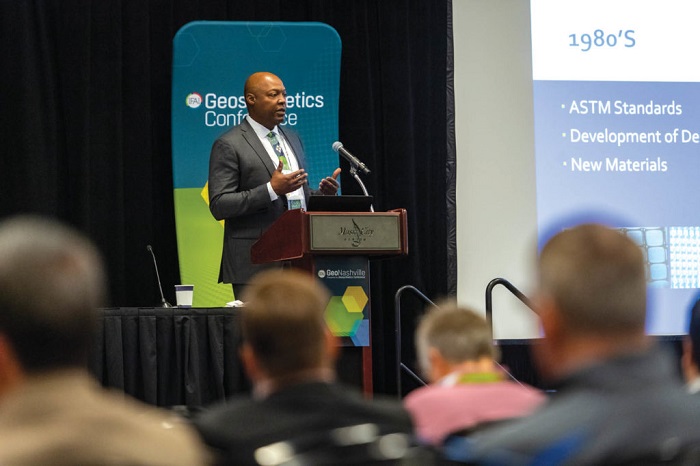
Geosynthetics professionals from across North America gathered in Nashville, Tenn., in November as the industry returned to in-person events. GeoNashville 2021, Nov. 4–5, 2021, drew 280 people to the Music City.
To maximize learning and networking opportunities, organizers decided to host the presenters and the exhibitors in the same room. Past events have sometimes made it difficult for exhibitors to attend the educational sessions. “The unique one-room setting helps to solve that problem,” says Fred C. Chuck, executive director of the Geosynthetic Materials Association.
The theme of GeoNashville 2021 was “Geotechnical Innovations, Renewed Connections,” a celebration of the in-person reuniting of members of the geosynthetics community after so many months/years apart and an emphasis on what speakers thought was coming for the geosynthetics world. This 1.5-day, all-plenary geosynthetics conference featured speakers from the U.S. Army Corps of Engineers (USACE) and the Federal Highway Administration (FHWA), presentations from several geosynthetics manufacturers on their innovative products, and an open discussion on the Infrastructure Investment and Jobs Act (IIJA) before the U.S. House of Representatives that was being considered during the conference and was subsequently passed by the House and signed into law by President Joe Biden. Jie Han, Ph.D., the 2021 R. M. Koerner Award and Lecture Series winner, presented his Koerner award lecture, “Geosynthetic-Reinforced Column-Supported Embankments: Bridging Theory and Practice.” Han is the Glenn L. Parker Professor of Geotechnical Engineering at the University of Kansas.
We wanted to come out of the pandemic a little bit forward thinking. We asked a lot of the presenters to tell us what they think the future of geosynthetics in their marketplace would be.
Fred C. Chuck, GMA Executive Director
Indeed, many of the speakers talked in detail about how they see the future of geosynthetics unfolding. Silas C. Nichols, principal geotechnical engineer with the FHWA Office of Infrastructure, said, “The things we are looking to do here are to continue to support construction and sustainability in transportation. I think the big overarching concepts geotechnically are these concepts of sustainability and speed of construction. They are mantras agencywide. We are looking to embrace them geotechnically, and we are looking at more ways to do that and geosynthetics apply directly. [We are also pursuing] continued support of research into new and existing materials.”
The organizers consider GeoNashville a success, and they are already planning the next full IFAI Geosynthetics Conference, Geosynthetics Conference 2023, co-located with the International Erosion Control Association (IECA) Annual Conference and Expo 2023. The conference will be held in Kansas City, Mo., Feb. 5–8, 2023. Visit the Geosynthetics Conference website for more information.
Todd R. Berger is the senior editor of Geosynthetics.
 TEXTILES.ORG
TEXTILES.ORG


